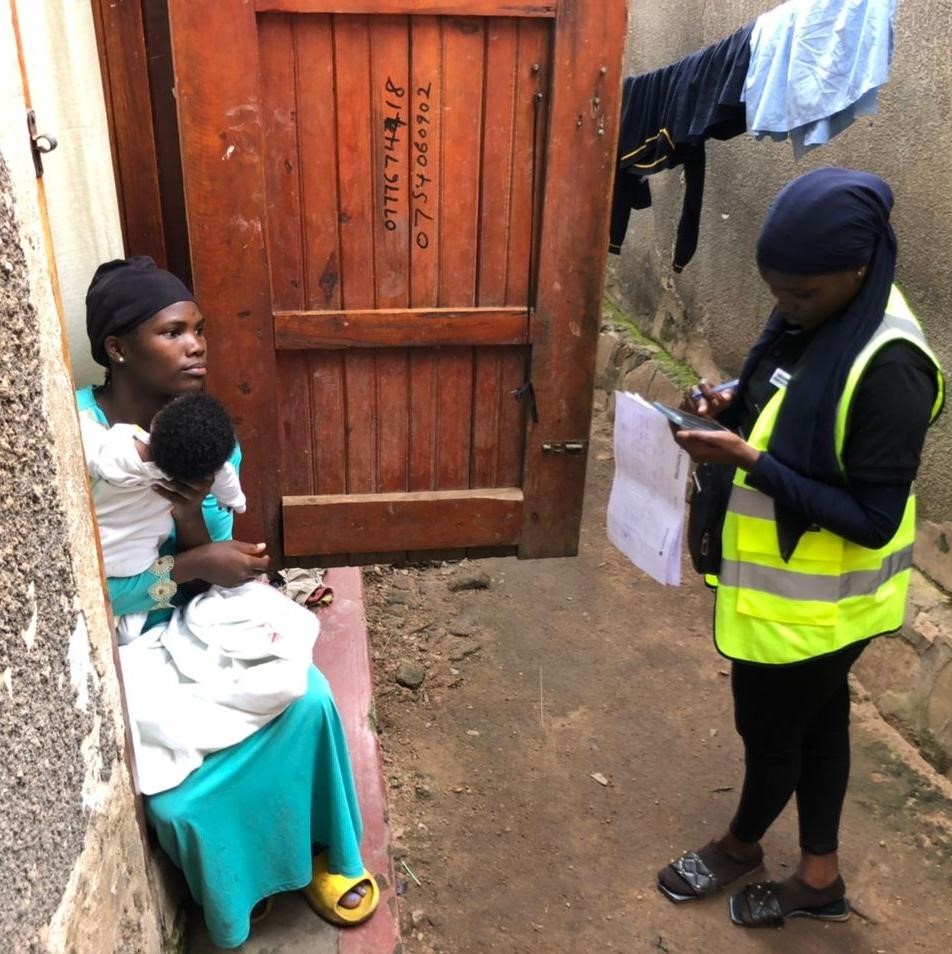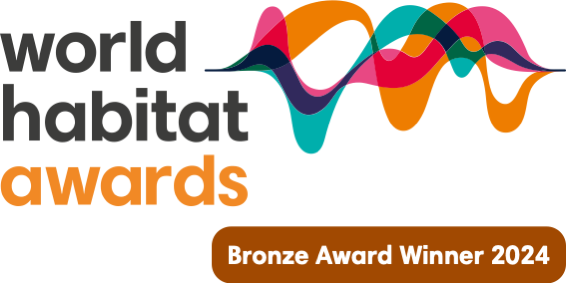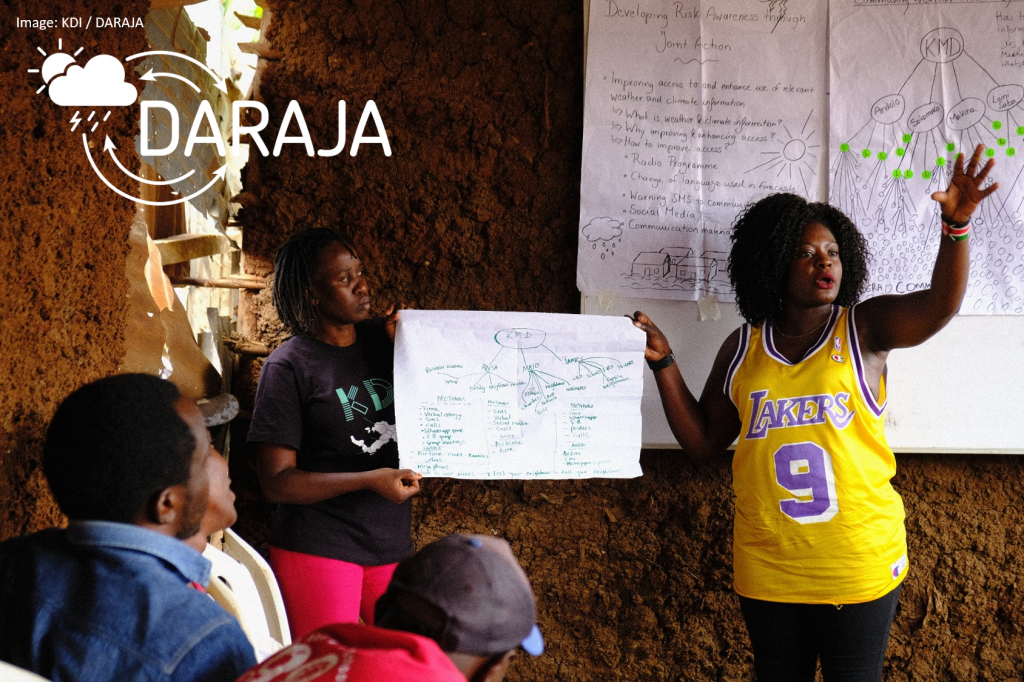Designing from the bottom up: The urban poor in Kampala provide inspiration for UN Secretary General’s flagship Early Warnings for All Initiative
A survey enumerator interviews a female resident of an informal settlement in Kampala’s Kawempe area about the impact of extreme weather on her household: Photo by Kaggwa Saddam ACTogether Uganda
FOR RELEASE ON December 3rd, COP28, Dubai, United Arab Emirates: The residents of informal settlements in Kampala are providing insight and inspiration for the UN Early Warnings for All Initiative that will be heavily showcased at COP28 in Dubai.
They are doing this by helping the Uganda National Meteorological Authority (UNMA) to design a new city weather forecast and early warning service from the bottom up. This will help the Ugandan capital’s four million inhabitants to prepare for floods, cold spells, heat waves and other weather-related hazards. Their work is guided by Africa’s most recent comprehensive research on urban community access to weather forecasts and early warnings which is being released during COP28.
Resurgence, a UK-based social enterprise that helps cities and their communities to protect themselves against weather and climate impacts, is facilitating this data-led deep co-design process with support from the UK Met Office Weather and Climate Services (WISER) Africa Programme and the Lloyd’s Register Foundation.
Resurgence CEO Mark Harvey said: “Kampala is the third city in East Africa to benefit from our DARAJA programme that innovatively reverse engineers the early warning design process by putting communities rather than risk experts in the design driving seat. DARAJA empowers vulnerable urban communities to participate in the design and communication of new weather information products that they can understand easily and use to take anticipatory action.”
“DARAJA, which means bridge in Swahili, has already created similar city forecasts and early warning systems in Nairobi in Kenya and Dar es Salaam in Tanzania and we are currently extending the initiative to Addis Ababa in Ethiopia and in 2024 into Khartoum, Sudan.”
15 DARAJA partners will be at COP28 advocating for community-centred approaches to be adopted across all elements of the UN Secretary General’s ambitious plan to reach all humanity with early warnings by 2027.
In the run up to COP28 Resurgence and its community development partner ACTogether Uganda, the national affiliate of Slum Dwellers International (SDI) conducted a baseline survey of low-income households in flood-prone informal settlements in Kampala. Respondents from 449 low-income families with average earnings of less than US$ 2 per day were asked in detail about the weather impacts they experience and the actions they take to deal with them. They were also asked about the weather information they receive and how it should be improved. The survey found that only 49% had access to weather forecasts and warnings on a daily basis, mostly through television and radio. But less than half of those who received such information understood it well. This limited the ability of people to take precautionary measures to avoid flood damage ahead of heavy rain, such as placing sandbags round their houses, clearing drains, digging drainage channels round their houses and moving their most valuable possessions to a safer location.
Respondents to the survey said they wanted forecasts and warnings to be expressed clearly without technical jargon in the local Luganda language – not in English which is the official language of government. They also wanted precise information about the areas of Kampala most likely to be hit by high impact weather. Furthermore, the slum dwellers said they wanted to receive city forecasts and warnings and related advice from UNMA through TV and radio stations that broadcast in the Luganda language and are popular among local residents.
96% of respondents said they had access to a mobile phone, many of which are smartphones with access to the internet. 34% of those who receive weather information at present said they often get it from social media.
The survey showed that flooding in informal settlements often results in damage to homes and household goods that is equivalent in value to several months of a family’s meagre income. And residents were concerned that flooding also causes outbreaks of life-threatening diseases such as malaria, typhoid, dysentery and flu.
Catherine Nimusiima, Program Manager, ACTogether said: “Well over half the inhabitants of Kampala live in informal settlements that lack adequate drainage and public services. It is vital for these people to get actionable weather information that they can understand easily well in advance of each severe weather event. We have seen from our DARAJA partners in Kenya and Tanzania how DARAJA will enable them to take anticipatory action to safeguard their families, property and livelihoods.”
The baseline research revealed that although Kampala is situated close to the Equator, people who live in the city’s informal settlements regard spells of unusually cold weather as a major hazard as well as heat waves. This highlights the need to communicate temperature information and its likely impacts more effectively in forecasts and warnings.
Representatives from the informal settlements will be among the Kampala city stakeholders taking part in a series of co-design workshops this week in parallel with COP28 to define the content, format, dissemination and feedback system of the new Kampala city forecast, which will be launched in 2024. The 2021 Lloyd’s Register Foundation World Risk Poll found that Uganda was among the least resilient countries in the world, ranking 102nd among 119 countries surveyed. The new early warning service in Kampala should help change that.
For further information and media interviews with DARAJA partners at COP28 and in Kampala please contact:
Mark Harvey
CEO Resurgence
Email: Mark@Resurgence.io
Dilupa Nanayakkara
Communications and Marketing Lead
Email: Dilupa@resurgence.io
Additional Information:
Short video of Catherine Nimusiima, Program Manager, ACTogether on DARAJA
Short video of George William, Senior Meteorologist, UNMA on DARAJA
Videos of 8 Inspirational DARAJA leaders
DARAJA is one of ten global transformation initiatives of the UNFCCC Race to Resilience , the winner of two international awards, and a learning initiative of Risk Informed Early Action Partnership of which Resurgence co-chairs with BBC Media Action the Risk Communication Working Group.



